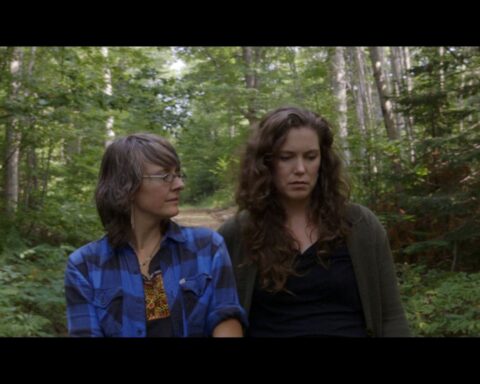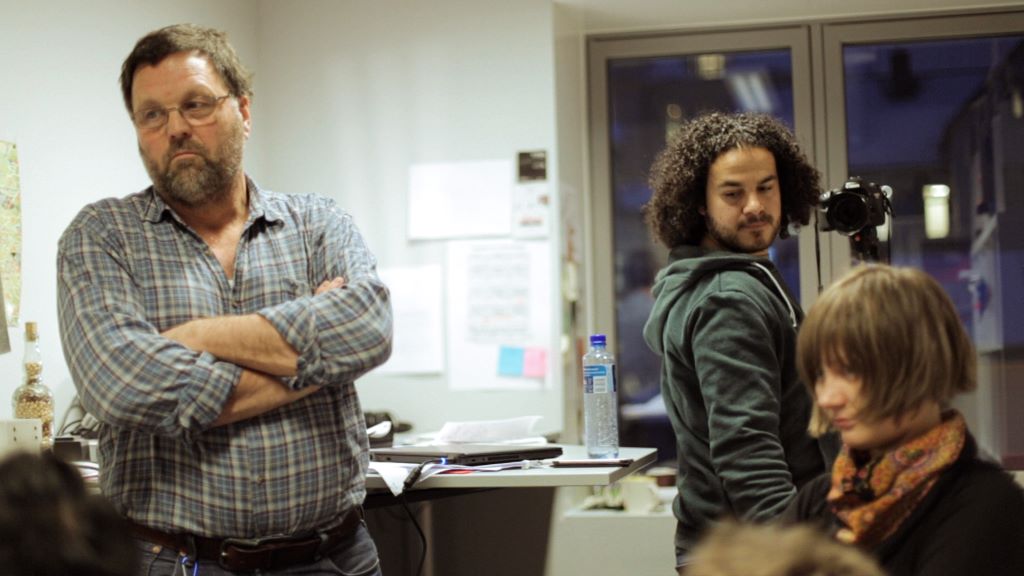The Hot Docs Forum returned to Toronto’s historic Hart House this week, featuring the typically strong slate of in-development feature documentaries, led by a host of hot-button U.S. projects.
Among the topics that caught the eye were deep-dive investigations into corporate corruption, verité portraits of UPS workers on strike, explorations of the weaponization of Holocaust memory, and a film exploring… erm… well… OK, I’ll just say it: granny porn.
But while the projects selections were strong, the table of attending commissioning editors and decision makers—at least half the reason producers splash out to attend the annual event—offered a comparatively weaker selection.
Of the bigger U.S. streamers, only National Geographic Documentary Films’ VP Tim Horsburgh attended, with no Netflix, Amazon, or Apple representatives at the table. Particularly egregious was the absence of any commissioner from the CBC, Canada’s national public broadcaster, which can have little excuse for not having a presence at Toronto’s flagship industry doc event.
Instead, the table leaned heavily on film funds—Chicken & Egg, Sundance Institute, The Whickers, Impact Partners, Catapult, the Points North Institute—and a handful of European and International commissioning editors.
Still! Let’s focus on the positives, of which there were plenty. Right off the bat, the first pitch of day one offered an eye-opening look at UPS workers on strike in the U.S., courtesy of Emmy nominated director Yael Bridge (The Big Scary “S” Word, Saving Capitalism) and Union producer Mars Verrone.
The tentatively titled Who Moves America follows the 2023 labour battle as the Teamsters union compelled delivery firm UPS to improve working conditions for its 350,000-strong workforce. UPS ships some 6% of the U.S. GDP every day, it’s estimated, so the stakes are high.
Decision makers around the table were quick to point to the recent success of Brett Story’s Amazon-centred feature doc Union, a Sundance winner this year and previously winner of the 2022 CMF-Hot Docs Forum Canadian Pitch Prize, as an example of the importance of these kinds of stories.
One might also look to the success of American Factory, Julia Reichert and Steven Bognar’s 2020 Oscar-winner, as proof of the under-recognized demand for well-made docs centring stories of blue-collar workers.
The pitch won praise from execs at Chicken & Egg, Impact Partners and the Sundance Institute, all of which had previously invested in Union, a film that “people couldn’t give money to fast enough,” recalled Kristin Feeley, the director of labs for the Sundance Institute’s Documentary Film Program.
Also drawing praise: the pitch for the Florida-set documentary Power and Light, which follows a team of investigative journalists looking into the state’s largest utility provider, following accusations that it had conspired to undermine democracy and stall action on Climate Change.
The proposed 90-minute feature, from director Jessica Anthony, was backed by a raft of strong producers, including Emmy and Peabody Award-winner Justine Nagan (Life Itself, The Interrupters) and Oscar-nominee Jon Shenk (Lead Me Home, The Island President). The pitch drew positive comparisons to docs such as Icarus and feature films such as Spotlight, although the decision-making table did have some questions.
Shanida Scotland, from the UK-based DOC Society, wanted to know about the scale of the ongoing investigation, while Kelsey Koenig, from Impact Partners, was curious to know if there was perhaps a “scrappier version” of the proposed budget the film could be made on. The filmmakers were seeking some $1.57m USD for an overall budget of $2m USD; a tall ask in these lean times.
More enthusiastic was the International Documentary Association’s director of funds and advocacy Keisha Knight, who directed the team to apply for the U.S. organization’s Enterprise Documentary Fund. The grant supports stories that integrate journalistic practice into the filmmaking process and is more important than ever, given “there’s a crisis in independent journalism right now,” she said.
At the other end of the spectrum, there was There’s Only One Shirley. One of the best-received pitches of the day – and certainly one of the lighter ones – focused on the personal and professional life of 89-year-old adult film star “Shirley,” as she attempts to navigate the perils of both the porn industry and Internet dating as an octogenarian.
Shot over the course of 10 years by Franco-American director Isadora Kosofsky, a photojournalist for the likes of TIME and National Geographic, the pitched promised a fascinating, if at times uncomfortable, exploration of a widely indulged but rarely discussed area of online adult entertainment. Indeed, Kosofsky certainly woke the room up with the opening line of her pitch: “‘Granny Porn’ was the number one most searched-for term on PornHub last year,” she said, “up 168% year-on-year… so I know some of you in the room know what I’m talking about,” to widespread laughter.
Documentaries centred on the adult entertainment field involve walking a fine line so as not to be as exploitative as the industry they’re documenting, but certainly features such as Rocco (2016), Hot Girls Wanted (2015) and After Porn Ends (2012) show it to be possible.
Jane Mote, editorial consultant for documentary fund The Whickers, was among those praising the “tenacity” of the filmmaking team, “for following the story for as long as you have,” while Impact Partners’ VP of production Kelsey Koenig was impressed by the “fabulous footage” the team had captured. Elsewhere, commissioning editor Lucia Kon, from UK pubcaster BBC Storyville, said the pitch “raises so many questions in my head.
“On the one hand there’s a lightness to it,” she offered, “but on the other it raises some really important issues.”
Of course, it was not just the American pitches that stood out at the Forum. Also drawing high praise was the Canadian documentary Ba’s Book, from Vietnamese Canadian director Ashley Da-Le Duong (A Time to Swim) and on-a-hot-streak Canadian producer Ina Fichman, who produced three of the films playing at this year’s festival (Adrianne and the Castle, 7 Beats Per Minute and The Bones.)
Using a hybrid combination of vérité and live-action recreation, the proposed film will see Da-Le Duong attempting to find a way to bring her father’s memoir to life. As the typically untalkative man finally opens up about his remarkable life, she discovers the story of a man who fled war-torn Vietnam only to land in 1970s revolutionary Iran, before using his artistic skills to escape to Canada.
The film arrived at the Forum with Telefilm Canada, the NFB and the Canadian Media Fund already having pledged support, and found a further enthusiastic audience at the Forum. Elaisha Stokes, the senior program manager from Chicken & Egg Pictures, was among those praising the team for “an amazing job that has captivated the whole room,” alongside financiers from The Whickers, the Hot Docs Incubator Fund and ARTE.
And Rasha Salti, commissioning editor for ARTE’s experimental documentary strand La Lucarne, pointed to the success of 2023 Cannes Film Festival-winner The Mother of All Lies, as an example of how films that push boundaries can go on to find acclaim. “I actually love the fact that you haven’t entirely figured out what your approach will be yet,” she said.
Finally, the standout film pitch of the Forum’s first day, and perhaps of the entire event, was the tentatively titled American documentary Arrest the Midwife, which won the Hot Docs Forum’s first look first place pitch prize of $20,000 CAD.
From Emmy nominated director Elaine Epstein (State of Denial) and PGA Award-nominee Robin Hessman (My Perestroika), the film will follow the arrest of three homebirth midwives in upstate New York, and the ensuing reaction from an unlikely group of activist Amish and Mennonite women.
While the credential of Certified Professional Midwife (CPM) is considered legitimate in 37 states in the U.S., it is not recognized in New York. So, when an attempted homebirth ends with the untimely death of an infant in 2019, one such CPM, who for years has assisted the Mennonite community with homebirths, found herself arrested, facing 40 years in prison. The teaser presented a powerful and complex piece of work that is sure to prompt discussion.
Impact Partner’s Koenig was among those outraged (in a positive way) by the film. “I’m getting fired up about this as a mother to a toddler,” she said. “Laws like this are really ruled by misogyny and racism. I think it’s a really important story and I’m really impressed by the access.”
Also impressed was Points North Institutes’ program director Sean Flynn, who found the pitch to be powerful. “The Mennonite community doesn’t typically let outsiders in to film,” he noted.
Given the intense focus on women’s health and reproductive rights in the U.S., following the dismantling of Roe v. Wade, and the general interest in isolated communities as seen in films like Women Talking, expect this pitch to find a home sooner rather than later.
Amidst the ongoing uncertain surrounding the festival, and the overwhelming challenges facing documentary financing in general, the return of the Hot Docs Forum next year is far from certain. And, assuming it does return, questions still remain as to how long the current ‘Public Pitch’ format can continue to remain relevant, as documentary deal-making becomes more and more secretive, and the larger U.S. players shy away from offering public comment.
But what is certain, is that Hot Docs is a vital place for the documentary industry to meet and talk shop each year.
We see the fruits of those talks every spring, as films that pitched at Toronto’s Hart House just a few years earlier—docs like Union, The Bones, Twice Colonized and Fire of Love—make their debuts at the likes of Sundance, SXSW, and the Berlinale. Let’s not forget that.













